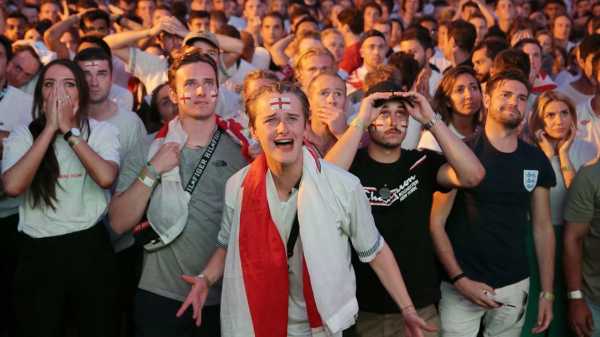
Fox Sports started Wednesday’s broadcast of its pre-game show, titled “2018 FIFA World Cup Live,” with a dynamic montage recounting France’s semifinal victory over Belgium at St. Petersburg Stadium. Samuel Umtiti glanced a header into the net from three different angles; euphoria frothed on the field and all around; in slow motion, a celebratory Umtiti sashayed away from his achievement with good rhythm and GIF-conscious savvy.
Surfing this wave of excitement, Fox’s Rob Stone welcomed us “to a clear day here in Red Square,” over a soundtrack sludgy with synthesized strings. Stone began to set up the upcoming semifinal match, between England and Croatia, at Luzhniki Stadium, with its naturally juicy narrative of England, the ancestral home of association football, questing after its first trip to the finals in five decades. “Could the World Cup be coming home, after last winning it all in 1966?” Stone wondered, with enough assurance in his delivery to give the sentence an illusion of grammatical fitness.
Stone then turned to Ice Cube, whose sinewy voice-over restated the theme over footage of the 1966 team and its young Queen. Cube paid homage to tradition, and in the next breath hailed this particular English team as rebels: “They’re playing like they don’t care what history has to say.” Cube talked up Croatia as a giant killer with the “vision” and the “nerve” to spoil England’s party. Stone thanked Ice Cube for the introduction and plugged Fox Sports’s relationship with Big3, the three-on-three basketball league co-created by the rapper.
After the break, Stone was behind a desk in Fox’s Red Square studio with Kelly Smith, Clarence Seedorf, and Alexi Lalas. A sulfur-colored cloudscape dominated the sky, onion domes hovering outside the frame. Smith, a veteran of the England women’s national football team, had just confessed to sweating over the fate of her nation, when she was drowned out by a coördinated monthly test of the broadcast stations of my area. This was only a test of the emergency-alert system. It let up at Smith’s final syllable, and the panel wheeled around to Lalas, who said nothing in particular in a genial fashion.
Stone could not wait to discuss crowd cameras and digest the images of fans gathered at vast viewing parties. He had been giddy twenty-four hours earlier, before France beat Belgium, to check on the flag-waving crowds in Paris and Antwerp. Now, his sources in England were telling him that “an extra ten million pints of beer” would be sold on Wednesday. “That is a forty-million-dollar boost to the economy,” he said. It is unclear whether than figure accounts for property damage and personal trauma. Stone continued, “The big question out there, of course, though is”—he drew air deeply, and sped his pace—“how many of those pints will simply just be thrown in the air?” We watched footage of a crowd in Flat Iron Square, in London, explode with flying foam during a recent victory. Smith and Lalas and Seedorf gaily tolerated Stone’s visceral jubilation.
One segment of the pre-game show was given over to a National Geographic channel report on Russian Buddhism. If this was intended as an outreach to soccer fans so ardent that they always burn in suffering, then perhaps it did some spiritual good. But, as an effort at a culture-enriching sideshow, it was unsuccessful, so out of sync with the analysis and hype surrounding it as to be charming. The correspondent said to the monk, “O.K., so, if everything is an illusion, what’s truth, then?”
The narration of Jeremy Irons lurked portentously into one last rousing montage. Inexorably, he quoted a Shakespeare phrase: “Once more unto the breach.” We were under way, delivered unto the capable larynxes of John Strong and Stu Holden. Strong, doing the play-by-play, narrates high drama clearly, shifting tones to diagram plays in the air. He’s good with silences, with letting the crowd noise fill space, except when his lust for recondite statistics gets the better of him. Holden, the analyst, has a thoughtful tension in his voice, and hint of a Scottish burr.

Further Reading
More coverage of the 2018 World Cup from The New Yorker.
In about the fifth minute, the Emergency Broadcast System reared up again. The acrid klaxon rang as usual, but also the picture disappeared. We resumed with England’s Kieran Trippier taking a free kick and scoring. Then the E.B.S. again intruded, and the picture disappeared, just long enough for a person who developed an emotional relationship with this test during the Cold War to freak out a bit and look into its background. I saw that, according to the Code of Federal Regulations, the E.B.S. consists of broadcast stations authorized “to operate in a controlled manner during a war, threat of war, state of public peril or disaster, or other national emergency.” I grimly wondered whether Donald Trump, somehow seizing on the fact that his Presidency constitutes a public peril, was warming up to start fire-hosing his tweets through our televisions.
At halftime, England led 1–0. From Fox’s Red Square studio, we received the payoff for Stone’s crowd-camera fixation: a delirious spray of lager. Going into a commercial, Stone bro-fully said, “Final forty-five from Luzhniki on the backside.” In the sixty-eighth minute, Croatia’s Ivan Perišić scored, and Holden was stirred to a simple, evocative sentence: “That goal has given them energy and life and belief.”
“Normal time finishes,” Strong said. “Croatia 1, England 1.” Now they were flinging beer in Zagreb. Smith reluctantly conceded that Croatia seemed to have the edge as extra time approached. When Croatia’s Mario Mandžukić scored, in the hundred-and-ninth minute, the jubilant gang-tackle that followed collapsed atop a sideline cameraman. When the whole thing was over, Strong was steady at the helm of a baritone bellow, chucking out data hailing Croatia as “the second-smallest nation in history to make the World Cup final!”
Sourse: newyorker.com






